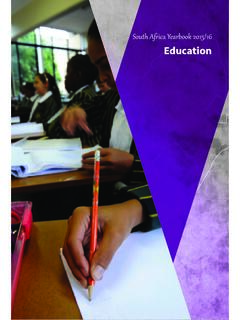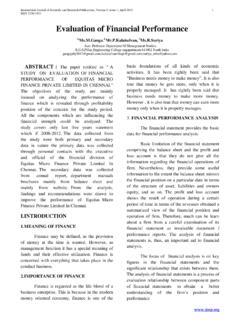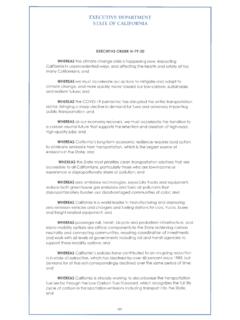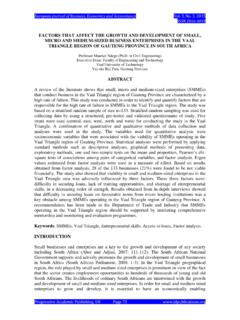Transcription of DEVELOPMENT FINANCE INSTITUTIONS DFIs in South Africa
1 Public Sector Manager April 201135 DEVELOPMENT FINANCE INSTITUTIONS dfis in South Africa35As one of the key channels through which government funding reaches communities, these INSTITUTIONS all have a real opportunity to improve the quality of life of people in South Africa . The table below gives a breakdown of some of the dfis and their mandates. Public Sector Manager also looked at some perspectives and DFI operations to unpack this Jacob Zuma has declared 2011 as the year for job creation and government is ready to push forward with economic growth through the New Growth Path (NGP). Implementation of the NGP will require greater leveraging of key INSTITUTIONS and agencies of the State, including but not limited to, the various DEVELOPMENT FINANCE INSTITUTIONS ( dfis ) in the Contact DetailsIndustrial DEVELOPMENT Corporation (IDC)The IDC is a self-financing, state-owned national DFI that provides financing to entrepre-neurs and businesses engaged in competitive : 011 269 3000 Fax: 011 269 3116 Bank of Southern Africa (DBSA)The purpose of the DBSA is to accelerate sustainable socio-economic DEVELOPMENT by funding physical, social and economic infrastructure.
2 Its goal is to improve the quality of life of the people of the region. The bank plays a multiple role of financier, adviser, partner, implementer and integrator to mobilise FINANCE and expertise for DEVELOPMENT : 011 313 3911 Fax: 011 313 3086 Housing FINANCE Corporation (NHFC)The NHFC was set up with a mandate to ensure that every South African with a regular source of income is able to gain access to FINANCE , to acquire and improve a home of his or her : 011 644 9800 Fax: 011 484 0204 Enterprise FinanceKhula is dedicated to the DEVELOPMENT and sustainability of small businesses in South Africa . It provides FINANCE , mentorship services and small business premises to small and medium enterprises (SMEs) through a network of partnerships and to encourage the sus-tainable DEVELOPMENT of SMEs while ensuring that Khula remains financially viable. Tel: 086 005 4852 Fax: 012 394 6901 Empowerment Fund (NEF)The NEF promotes and facilitates Black Economic Empowerment (BEE) and transformation.
3 Its mandate and mission is to be a catalyst of Broad-Based BEE through asset management, fund management and strategic : 011 305 8000 Fax: 011 305 8001 Independent DEVELOPMENT Trust (IDT)The IDT has a mandate to support government in meeting its social mandate of alleviating poverty in improving the quality of life of poor rural communities. It has created a reputa-tion for being a DEVELOPMENT programme-implementing agency focusing on DEVELOPMENT planning, implementation, and the coordination of government : 012 845 2000 and Agricultural De-velopment Bank of South AfricaThe Land Bank is a specialist agricultural bank guided by a mandate to provide financial services to the commercial farming sector and to agribusiness and to make available new, appropriately designed financial products that would facilitate access to FINANCE by new entrants to agriculture from historically disadvantaged backgrounds.
4 Tel: 012 686 0500 Fax: 012 686 0718 Youth Develop-ment Agency (NYDA)The NYDA s mandate is to: advance youth DEVELOPMENT through guidance and support to initiatives across sectors of society and spheres of government embark on initiatives that seek to advance the economic DEVELOPMENT of young people develop and coordinate the implementation of the Integrated Youth DEVELOPMENT Plan and Strategy for the country. Tel: 086 009 6884 Fax: 086 606 6563 Urban Reconstruc-tion and Housing Agency (Nurcha)Nurcha supports the national programme to house all South Africans in sustainable human settlements. Nurcha provides bridging FINANCE to contractors and developers involved in the construction of subsidy and affordable housing, community facilities and infrastructure. Tel: 011 214 8700 Fax: 011 880 9139 Housing Loan Fund (RHLF)The RHLF s core business is providing loans, through intermediaries, to low-income households for incremental housing purposes.
5 Incremental housing is a people-driven process; and the RHLF s core business is to empower low-income families in rural areas to access credit that enables them to unleash the potential of their self-help, savings and local ingenuity to build and improve their shelter over : 011 621 2513 Fax: 011 621 2520 African micro - FINANCE Apex Fund (Samaf )Samaf is tasked to facilitate the provision of affordable access to FINANCE by micro , small and survivalist business for the purpose of growing their own income and asset base. The primary purpose of Samaf is to reduce poverty and unemployment and also to extend financial services to reach deeper and broader into the rural and peri-urban : 012 394 1796 Fax: 012 394 2796 Agriculture FINANCE Scheme of South Africa (Mafisa)Mafisa was developed as a micro and retail agricultural financial scheme for economically active poor people. Mafisa allows access to financial services through selected INSTITUTIONS on an affordable and sustainable basis.
6 It assists with loans to target groups, individuals, farmers and other groups as well as savings and banking facilities at approved financial INSTITUTIONS . Tel: 012 319 7295 Fax: 012 319 7278 Public Sector Manager April 201140 With stories from around the globe of well-established companies being impacted on by the global economic downturn, and government bail-outs becoming commonplace often with little effect it is of great interest to see South Africa s approach to this problem and to learn of the efforts of the Industrial DEVELOPMENT Corporation (IDC) to assist distressed companies, writes Mandla Mpangase. As you near the town of Wellington in the West-ern Cape, two things start to happen. Firstly, you find yourself marvelling at the beauty of the lush green surrounds of the Paarl area. Secondly, you start no-ticing more and more trucks passing you by, all branded with the name: Slabbert Burger.
7 As you make your way down Distillery Road through the heart of this picturesque town, the frequency of these passing trucks increases, until you find an impressive head of-fice and adjoining truck depot, with red corrugated roofing with the same branding as the passing trucks. These are the headquarters of Slabbert Burger Transport. It has the intimacy of a small business about it, but is by no means a small player in the southern Af-rican transport industry. This se-cond-generation family-owned business has come a far way from its inception in 1957, when founder Burger bought his first few trucks and began offering logistical services to fruit farmers and fruit-juice manufac-turers in Paarl. Today, the company employs more than 800 people, and with a fleet of over 400 vehicles, services diverse sectors from food and beverage to mining and steel. But this tale of success could have been lost, just a few months ago.
8 Director, Martin Burger, explains: We have many clients in the steel industry, which in the last couple of years leading up to 2008, was going through a boom. There was a big push from these clients for more and more logistics capa- city and an increased number of trucks. Steel industry clients require in-bound and out-bound logistics for bringing in raw material crucial in the steel production process such DEVELOPMENT FINANCE INSTITUTIONS : CASE STUDY for companies in distressEconomic resuscitationFrom left to right, Martin Burger, Katinka Schumann of the IDC and Jannie Burgeras lime, manganese and coal, and for exporting finished products. This shortage in supply was further aggravated by the failing of the local railway services in accommodating the increased demand for transport. What happened next was a double blow: In a notoriously competitive industry like transportation, the continuous pressure and growing demand for service drove the com-Public Sector Manager April 201143 DEVELOPMENT FINANCE INSTITUTIONS : CASE STUDY pany to almost double its fleet from 220 to 450 trucks in the space of just three years.
9 This was met with the sudden collapse in transport demand from the mining, steel and construction industries in the wake of the global economic crisis. The company was left facing severe cash-flow pres-sures and an inability to service debt. Things became progressively more difficult. In mid-2009, we began experiencing a serious cash-flow problem, which we couldn t trade out of. That s when we decided to approach the IDC for assistance, says Burger, who has a background in general management and has been with the company since 1991. The IDC is a self-financing, DEVELOPMENT FINANCE insti-tution. It was established in 1940 to promote economic growth and industrial DEVELOPMENT in South Africa . Realis-ing that South Africa would not be spared the effects of the global downturn, in 2008, the IDC set up a R6,1-billion fund to assist companies that were negatively affected as a result of the recession. The fund focuses on assisting businesses, like Slabbert Burger Transport, who have successful track records and a strong potential to emerge from the crisis.
10 However, the main objective is to preserve existing jobs while creating new ones. As part of the IDC s intervention, a due diligence study was conducted which revealed that the company could return to a position of profitability on a month-to-month basis. This meant the company could definitely trade out of its situation given the opportunity. Katinka Schumann, Divisional Executive of Services Sec-tor, says at the time that the commercial banks were tightening their lending criteria; the IDC was able to step forward and provide a R60-million facility to assist Slabbert Burger Transport. We provided the company with the necessary sup-port they needed to help them turn their operations around. The IDC team involved has done a tremendous job. The company is not completely out of the woods yet, but the worst is definitely behind them, explains one of the largest businesses in the area, Slabbert Burger procures services and supplies from many of the smaller businesses in the Paarl area.














